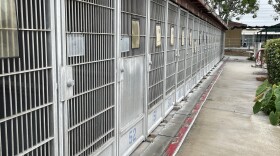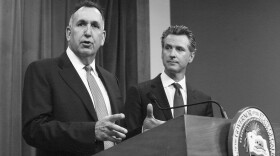U.S. banks made more than $20 billion last year trading derivatives -- those much-maligned financial products that brought down AIG and fueled the mortgage market meltdown. But a provision in the financial overhaul bill being debated in the Senate could force them out of the business.
"In my view," said Sen. Blanche Lincoln (D-AR), one of the provision's biggest supporters, "banks were never intended to perform these activities, which have been the single largest factor to these institutions growing so large that taxpayers had no choice but to bail them out in order to prevent total economic ruin."
Lincoln's provision would ban banks eligible for government backing, like Fed lending or deposit insurance, from trading derivatives.
But not everyone thinks they should be out of the business.
"This idea that somehow now banks can't be doing derivatives, even hedging, is really not a good idea," said Sheila Bair, chairman of the Federal Deposit Insurance Corp. "Derivatives are not all evil."
In fact, trading derivatives is a core function of banks, Bair says. She argues that moving derivatives trading out of banks, which are highly regulated, could push the business into less regulated markets.
Dueling Definitions
But what are derivatives, exactly?
Sen. Christopher Dodd (D-CT), chairman of the Senate Banking Committee, offers this definition: "Really what it amounts to in simple terms that most Americans can understand is, it's a bet. It's a wager."
There's nothing intrinsically evil about banks doing this sort of work. What is intrinsically evil is for them to be saying to people, 'You are my client, I have your interests at heart. I am going to organize this in your benefit,' and then designing instruments through which your customers are screwed.
Cory Strupp, a lobbyist for the Securities Industry and Financial Markets Association, disagrees.
"I don't think it's fair to characterize this as bets, anymore than when a bank makes a loan they're making a bet that maybe some day they'll get paid back," he said.
Strupp says banks use derivatives to reduce their risk and the risks of their customers.
A bank might have a customer who, for example, is a homebuilder and wants some protection from a rise in interest rates. So, the bank sells the homebuilder a derivative called an interest rate swap. The bank is then on the hook to pay the homebuilder if interest rates go up.
But the bank may not want to run that risk, either, so it could create another swap for a different customer who would be hurt if interest rates fall. The two swaps cancel the bank's risks.
Robert Litan, a financial expert at the Kauffman Foundation, says derivatives reduce costs and provide protection for a wide range of businesses.
"They allow a lot more commerce to take place than otherwise would exist," he said. "So they're sort of one of these ingredients that we take for granted and sometimes exaggerate the dangers of. We need derivatives, but we also need rules to make them safe."
Trading Publicly
Martin Mayer, a guest scholar at the Brookings Institution, agrees, but warns that banks can also abuse their role as derivatives traders.
"There's nothing intrinsically evil about banks doing this sort of work," he said. "What is intrinsically evil is for them to be saying to people, 'You are my client, I have your interests at heart. I am going to organize this in your benefit,' and then designing instruments through which your customers are screwed."
That's essentially what Goldman Sachs has been accused of doing.
Mayer warned of the dangers of derivatives more than a decade ago. He says he doesn't think banks should be prohibited from trading them, but if they do, he says, they need to be required to do trades in the open, on public exchanges, not in the private over-the-counter market.
"It's the hidden nature of this over-the-counter market that is really disturbing," he said.
Most derivatives trading would be forced into open clearinghouses and exchanges by the financial overhaul bill before the Senate. Banks are lobbying hard to convince lawmakers that under those conditions, they can safely remain in the derivatives business.
Copyright 2022 NPR. To see more, visit https://www.npr.org. 9(MDAzMjM2NDYzMDEyMzc1Njk5NjAxNzY3OQ001))






